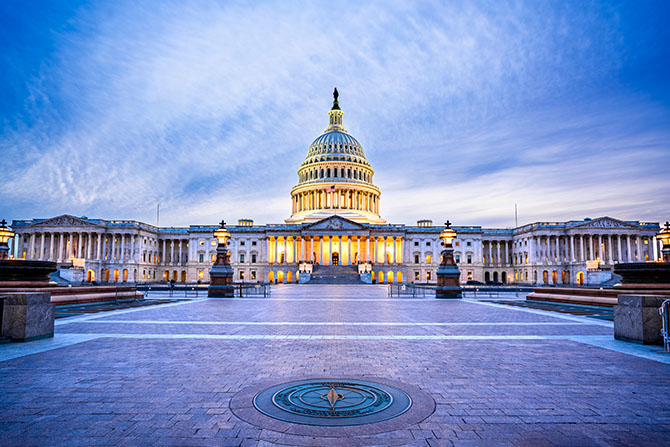VADA Leaders Attend Annual NADA Washington Conference; Here Are the Top Issues
One of the benefits of working out of Richmond is our proximity to Washington, D.C.
Such short distance to the nation’s capital makes it easy for VADA staff to attend NADA’s Annual Washington Conference. This year’s event, held in mid-September, saw dealer association leaders from across the U.S. gather to discuss the myriad developments and challenges of the industry and world economy.
The VADA team in D.C. included Legislative Affairs Director Ralston King, General Manager Steve Hoffman, Field Representative Pat Martin, and Mike Suttle of Suttle Motors, who serves as NADA Director for Virginia.
The group had numerous positive interactions with various Congressional members from both political parties. This included U.S. Rep. Lisa Blunt Rochester (D-DE), Rep. Roger Williams (R-TX) and a dealer himself, and Sen. Katie Britt (R-AL). Dealers also heard from Ali Zaidi, the National Climate Advisor under President Biden. VADA’s own Geoff Pohanka, who serves as NADA Chair, also spoke to attendees.
Leaders also lobbied with Congressional representatives and their aides on a number of key federal issues impacting dealerships.
See this article on vada.com/news to find issue pages for more detail.
FTC REDO Act (NADA Position: Support)
The Federal Trade Commission (FTC) proposed a “Vehicle Shopping Rule” that would overwhelm car buyers and small businesses with additional paperwork and needlessly lengthen the sales process.
Among other issues, the rule increases the complexity of the car-buying process, adding more paperwork to an already paperwork-intensive process for consumers while also creating inconsistent and unnecessary rules and burdens for small businesses.
The rule was proposed without credible data-driven analysis or the necessary time for public comment to avoid unintended consequences for consumers and small businesses. A comprehensive study by the Center for Automotive Research found that the 10-year cost of the rule would be over $38 billion. Overall, the FTC’s proposed rule would make the auto buying experience worse, not better, for consumers.
The “FTC REDO Act” directs the FTC to “redo” its flawed Vehicle Shopping Rule, but this time with basic regulatory safeguards the agency should have properly undertaken in the first place.
NADA’s Ask:
Cosponsor the soon-to-be-introduced House and Senate FTC REDO Act.
EPA Requirements (NADA Position: Oppose)
The Environmental Protection Agency (EPA) proposed new emissions standards that would effectively require 67.5% of U.S. car sales to be electric by 2032.
New car and truck dealers are essential to sell and service EVs and have already invested $5.5 billion of their own capital in the tools, equipment, training and recharging infrastructure, which are critical to laying the foundation to move from early adopters to mass marketing EVs to the average consumer. Despite federal incentives, customers are not purchasing electric vehicles in the quantities required for automakers to meet these different government mandates.
The current EPA proposal ignores real-world consumer demand and, as a result, “goes too far, too fast,” NADA says.
Consumers are not moving as fast as the proposed regulations, largely because of the other changes needed to make EVs broadly attractive to consumers: affordability, a sufficient and reliable charging infrastructure, and acceptable charging speeds.
A single national standard for achievable greenhouse gas regulations that leverages consumer demand is needed to produce the fleet turnover necessary to deliver environmental benefits.
NADA’s Ask:
House and Senate Republican members are encouraged to sign a letter led by Rep. Lisa McClain (R- MI), addressed to Republican congressional leadership, opposing EPA’s 67% EV mandate.
ADDITIONAL ISSUES
Supply Chain Disruptions Relief Act (NADA Position: Support)
Under existing law, the Treasury Department has the authority to allow businesses that utilize the last-in first-out (LIFO) accounting method extended time to replace inventory if a “major foreign trade interruption” makes inventory replacement difficult or impossible.
Pandemic-related global disruptions and reduced auto production made it impossible for dealers to replenish new vehicle supply. Despite broad bipartisan support for the Treasury’s use of its existing authority regarding vehicle inventory, the Treasury declined as it believes additional legislative authority is needed.
Under the “Supply Chain Disruptions Relief Act” (H.R. 700/S. 443), Congress would determine that the conditions necessary to grant additional time to replace vehicle inventories under existing law due to pandemic-related foreign trade interruptions have been met.
NADA wants legislators to cosponsor the “Supply Chain Disruptions Relief Act” (H.R. 700/S. 443) and urge House and Senate leadership to pass this technical and non-controversial legislation at the earliest opportunity.
Fight Rising Catalytic Converter Theft (NADA Position: Support)
As many Virginia dealers know, catalytic converters are being stolen at increasingly higher rates due to their valuable metals, such as rhodium, platinum and palladium.
Thieves can easily steal catalytic converters from unattended vehicles, and since catalytic converters are not readily traceable, there is a lucrative market for these stolen parts. These thefts are costing millions of dollars to businesses and individual vehicle owners alike. In addition, replacing a catalytic converter is costly and often difficult due to the part’s skyrocketing demand and supply chain shortages.
NADA is asking Congress to pass H.R. 621/ S. 154, the “Preventing Auto Recycling Theft Act” (PART Act), which would help law enforcement combat catalytic converter theft by marking catalytic converters and creating a more transparent market that deters its theft.
The So-Called “Right to Repair” Bill, which actually raises serious privacy, security and safety issues for consumers (NADA Position: Oppose)
Advocates for “right to repair” legislation claim that independent automotive repair shops do not have access to the parts or data necessary to repair vehicles.
However, this concern was rectified years ago, and today, the information independent shops need to repair vehicles is readily available from every auto and truck manufacturer. The latest iteration of “right to repair” legislation (H.R. 906) has little to do with repairing a vehicle. Instead, the bill compels auto and truck manufacturers to provide any “aftermarket parts manufacturer” the information necessary “to produce or offer compatible aftermarket parts,” i.e., parts not made by the auto or truck manufacturer.
This legislation would also give any third-party access to sensitive consumer data from vehicles, which raises consumer privacy, vehicle security and automotive safety concerns. This bill regulates only vehicles and does not apply to other equipment or products, such as farm equipment or mobile phones.
NADA is asking Congress to oppose the REPAIR Act legislation, H.R. 906, which raises serious vehicle privacy, security and safety issues for consumers.







